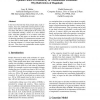Free Online Productivity Tools
i2Speak
i2Symbol
i2OCR
iTex2Img
iWeb2Print
iWeb2Shot
i2Type
iPdf2Split
iPdf2Merge
i2Bopomofo
i2Arabic
i2Style
i2Image
i2PDF
iLatex2Rtf
Sci2ools
IJIS
2006
2006
Optimal choice of granularity in commonsense estimation: Why half-orders of magnitude?
It has been observed that when people make crude estimates, they feel comfortable choosing between alternatives which differ by a half-order of magnitude (e.g., were there 100, 300, or 1,000 people in the crowd), and less comfortable making a choice on a more detailed scale, with finer granules, or on a coarser scale (like 100 or 1,000). In this paper, we describe two models of choosing granularity in commonsense estimates, and we show that for both models, in the optimal granularity, the next estimate is 3-4 times larger than the previous one. Thus, these two optimization results explain the commonsense granularity.
| Added | 12 Dec 2010 |
| Updated | 12 Dec 2010 |
| Type | Journal |
| Year | 2006 |
| Where | IJIS |
| Authors | Jerry R. Hobbs, Vladik Kreinovich |
Comments (0)

